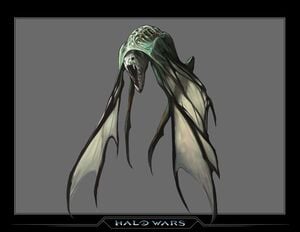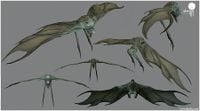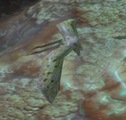Flood swarm form: Difference between revisions
From Halopedia, the Halo wiki
(Robot: Template replacement, replaced: {{fact}} → {{citation needed}}) |
No edit summary |
||
| (36 intermediate revisions by 20 users not shown) | |||
| Line 1: | Line 1: | ||
{{ | {{Status|Canon}} | ||
{{Flood infobox | |||
|name=Flood swarm form | |||
|image=[[File:HW FloodSwarm Concept.jpg|300px]] | |||
{{Flood | |height= | ||
|name=Flood | |distinctions=Airborne{{Ref/Game|Id=HW|HW|Gameplay}}{{Ref/Reuse|Enc22P409}} | ||
|image=[[File: | |species=[[Flood combat form|Combat form]] | ||
|height= | |attacks=Fires barb-like projectiles at enemies.{{Ref/Reuse|Enc22P409}}{{Ref/Reuse|HW}} | ||
|distinctions=Airborne | |||
|species=[[Flood]] | |||
|attacks= | |||
|notable= | |notable= | ||
}} | }} | ||
''' | The '''swarm form''' is a variety of airborne [[The Flood|Flood]] [[Flood combat form|combat form]]. Created via infection of predatory avian creatures,{{Ref/Book|Id=Enc22P409|Enc22|Page=409}} these forms are generally seen travelling and attacking in groups. Numerous swarm forms were encountered on the [[Forerunner]] [[shield world]] of [[Trove]] during [[Battle of Trove|a conflict]] in early [[2531]].{{Ref/Reuse|HW}} | ||
== | ==Overview== | ||
=== | ===Description=== | ||
The swarm form is an airborne [[Flood]] [[Flood combat form|combat form]] that possess a hunched body, two bony wings, a gaping mouth, two black eyes, and a pair of elongated trailing limbs.{{Ref/Reuse|Enc22P409}}{{Ref/Reuse|HW}} Its mouth is full of teeth and its limbs end in razor-sharp talons. Despite their large size, swarm forms are surprisingly swift.{{Ref/Reuse|Enc22P409}} | |||
The swarm forms found on [[Trove]] were created through the infection of large, predatory avian creatures that possessed adequate calcium reserves and resilient neurosystems.{{Ref/Reuse|Enc22P409}} | |||
===Behavior=== | |||
As their name implies, swarm forms generally move in groups, launching highly sophisticated attacks in coordination with others of its kind.{{Ref/Reuse|HW}}{{Ref/Reuse|Enc22P409}} In addition to their sharp talons and teeth that can be used to rend prey into pieces,{{Ref/Reuse|Enc22P409}} swarm forms can launch infectious barbed projectiles at enemies, much like the [[Flood ranged form]].{{Ref/Reuse|HW}}{{Ref/Reuse|Enc22P409}} | |||
== | ==History== | ||
During the [[Battle of Trove]] in [[2531]], the crew of the {{UNSCShip|Spirit of Fire}} and [[Covenant]] forces encountered numerous flocks of swarm forms.{{Ref/Reuse|HW}} | |||
==Gallery== | |||
<gallery> | |||
File:HW FloodSwarmForm 1.png|A swarm form. | |||
File:HW FloodSwarmForm 2.png|Top down view of the swarm form's wings. | |||
File:HW_FloodSwarm_Render.jpg|An early iteration of the Flood swarm model. | |||
File:HW Flood Swarm.png|A swarm on Trove. | |||
</gallery> | |||
==List of appearances== | |||
*''[[Halo Wars]]'' {{1st}} | |||
== | |||
==Sources== | ==Sources== | ||
{{Ref/Sources}} | |||
{{Flood}} | {{Flood}} | ||
[[Category: | [[Category:Flood]] | ||
[[Category:Flood forms]] | |||
Latest revision as of 22:05, September 8, 2024
| Flood swarm form | |
|---|---|

| |
| General overview | |
|
Distinctions: |
|
|
Method of attack: |
|
The swarm form is a variety of airborne Flood combat form. Created via infection of predatory avian creatures,[2] these forms are generally seen travelling and attacking in groups. Numerous swarm forms were encountered on the Forerunner shield world of Trove during a conflict in early 2531.[1]
Overview[edit]
Description[edit]
The swarm form is an airborne Flood combat form that possess a hunched body, two bony wings, a gaping mouth, two black eyes, and a pair of elongated trailing limbs.[2][1] Its mouth is full of teeth and its limbs end in razor-sharp talons. Despite their large size, swarm forms are surprisingly swift.[2]
The swarm forms found on Trove were created through the infection of large, predatory avian creatures that possessed adequate calcium reserves and resilient neurosystems.[2]
Behavior[edit]
As their name implies, swarm forms generally move in groups, launching highly sophisticated attacks in coordination with others of its kind.[1][2] In addition to their sharp talons and teeth that can be used to rend prey into pieces,[2] swarm forms can launch infectious barbed projectiles at enemies, much like the Flood ranged form.[1][2]
History[edit]
During the Battle of Trove in 2531, the crew of the UNSC Spirit of Fire and Covenant forces encountered numerous flocks of swarm forms.[1]
Gallery[edit]
List of appearances[edit]
- Halo Wars (First appearance)
Sources[edit]
| |||||||||||||||||||||||||||||||||



